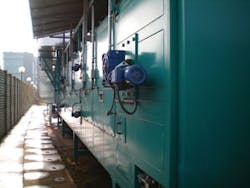MBR technology from Siemens selected as pilot to treat refinery wastewater
WARRENDALE, PA, March 18, 2010 -- Members of PERF (Petroleum Environmental Research Forum) have selected Siemens Water Technologies to provide a Petro MBR (membrane bioreactor) pilot unit to test the viability of such technology in treating refinery wastewater. This will be one of the first full-scale operational MBR processes for treating refinery wastewater in the world. The results of this pilot testing will be used to determine the effectiveness and robustness of MBR treatment compared to conventional biological treatment on these types of wastewater. The commercially-sized Petro MBR pilot unit will run for six to nine months at a PERF site in Baton Rouge, Lousiana, USA.
Specifically designed to meet the goals of petroleum and chemical industry operators with flexibility and ease of operation, the Petro MBR system combines an activated sludge biological treatment process with an innovative membrane filtration system. A unique fluid renewal process evenly distributes liquid, solids and air within the membrane modules in the system. The system is ideally suited to a wide range of refinery, petrochemical and production water treatment applications including water reuse, upgrades, retrofits and compliance-driven projects.
PERF (www.perf.org) was established in 1986 to stimulate cooperative research and development of technology for environmental pollution control and waste treatment for the petroleum industry. Members include: Amerada Hess Corporation, Aramco Services Co., BOC, BP, Canadian Petroleum Products Institute (CPPI), Chevron Research & Technology Company, ConocoPhillips, EniTecnologie, ExxonMobil, Marathon Oil Company, Petro-Canada, Petrobras, Questor, Repsol YPF, Shell, Statoil, Total and Veolia Water.
The Siemens Industry Sector (Erlangen, Germany) is the worldwide leading supplier of environmentally friendly production, transportation, building and lighting technologies. With integrated automation technologies and comprehensive industry-specific solutions, Siemens increases the productivity, efficiency and flexibility of its customers in the fields of industry and infrastructure. The Sector consists of six divisions: Building Technologies, Drive Technologies, Industry Automation, Industry Solutions, Mobility und Osram. With around 207,000 employees worldwide (September 30), Siemens Industry achieved in fiscal year 2009 total sales of approximately €35 billion. http://www.siemens.com/industry
The Siemens Industry Solutions Division (Erlangen, Germany) is one of the world's leading solution and service providers for industrial and infrastructure facilities comprising the business activities of Siemens VAI Metals Technologies, Water Technologies and Industrial Technologies. Activities include engineering and installation, operation and service for the entire life cycle. A wide-ranging portfolio of environmental solutions helps industrial companies to use energy, water and equipment efficiently, reduce emissions and comply with environmental guidelines. With around 31,000 employees worldwide (September 30), Siemens Industry Solutions posted sales of €6.8 billion in fiscal year 2009. Further information and downloads at: http://www.siemens.com/industry-solutions
###

